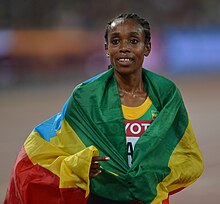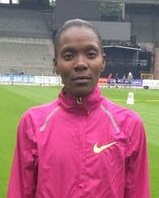2016 Summer Olympics / Athletics - 10,000 m (women)
|
|
|||||||||

|
|||||||||
| sport | athletics | ||||||||
| discipline | 10,000 meter run | ||||||||
| gender | Women | ||||||||
| Attendees | 37 athletes from 24 countries | ||||||||
| Competition location | Estádio Nilton Santos | ||||||||
| Competition phase | August 12, 2016 | ||||||||
|
|||||||||
The women's 10,000 meter run at the 2016 Olympic Games in Rio de Janeiro was held on August 12, 2016 at the Estádio Nilton Santos . 37 athletes took part.
The Ethiopian Almaz Ayana , who won with a new world record time before the Kenyan Vivian Cheruiyot , became the Olympic champion . Bronze went to the Ethiopian Tirunesh Dibaba .
Athletes from Germany, Switzerland, Austria and Liechtenstein do not take part.
Current titleholders
| Olympic Champion |
Tirunesh Dibaba ( Ethiopia )
|
30: 20.75 min | London 2012 |
| world champion |
Vivian Cheruiyot ( Kenya )
|
31: 41.31 min | Beijing 2015 |
| European champion |
Yasemin Can ( Turkey )
|
31: 12.86 min | Amsterdam 2016 |
| North / Central American / Caribbean Master | Competition not in the championship program | San José 2015 | |
| South America Champion | Inés Melchor ( Peru )
|
32: 28.87 min | Lima 2015 |
| Asian champion |
Alia Saeed Mohammed ( VAR )
|
31: 52.29 min | Wuhan 2015 |
| African champion |
Alice Nawowuna ( Kenya )
|
30: 26.94 min | Durban 2016 |
| Oceania champion | Mary Kua ( Papua New Guinea )
|
40: 39.52 min | Cairns 2015 |
Existing records
| World record |
Wang Junxia ( People's Republic of China )
|
29: 31.78 min | Beijing , People's Republic of China | September 8, 1993 |
| Olympic record |
Tirunesh Dibaba ( Ethiopia )
|
29: 54.66 min | Beijing 10,000 m run , People's Republic of China | August 15, 2008 |
Note: All times are based on Rio local time ( UTC-3 ).
run
August 12, 2016, 11:10 a.m.
The competition was held directly in a final run without qualification. The favorites came primarily from African countries, but US runners were also among them. The Olympic champion in 2008 and 2012 and World Champion in 2013 Dibaba of Ethiopia was officially introduced to the reigning world champion Vivian Cheruiyot of Kenya. In addition, the Ethiopian vice world champion Gelete Burka and the two Americans Emily Infeld and Molly Huddle, who had finished third and fourth at the last world championships, were among the contenders for the top positions. There was also the Turkish European Champion Yasemin Can.
The Kenyan Alice Nawowuna took over the role of the leader for the entire first half of the course. The first kilometer was the only one that was run slower than three minutes. Then the race turned into a real hell of a ride, even the existing world record was in danger. After the 5000 meter mark, which was reached almost twenty seconds faster than seven days later in the 5000 meter final, the Ethiopian Almaz Ayana attacked and accelerated the pace again, the following kilometer section was even less than 2:50 min run through. At first, Cheruiyot could still follow, while Nawowuna had to let go. After six kilometers, the pace leveled off again at times of a little more than 2:50 minutes for the individual 1000-meter sections, so it still remained a world record. Soon the world champion could no longer keep up. By the penultimate lap, the leading Ethiopian had run out around a hundred meters ahead of her. Almaz Ayana undercut the 23-year-old world record of the Chinese Wang Junxia by 14.33 seconds and became the superior Olympic champion. Vivian Cheruiyot finished second, more than fifteen seconds behind. She set a new national record for Kenya. Another ten seconds behind her, Tirunesh Dibaba won the bronze medal. Alice Nawowuna, who had led for a long time, came in fourth place just under eleven seconds behind Dibaba. The first four of this race undercut the 30-minute mark. The Kenyan Betsy Saina was fifth ahead of Molly Huddle, who set a new American record just a minute behind the winner. Yasemin Can came in seventh as the best European representative, ahead of Gelete Burka.
In the eighth Olympic final of this discipline of women's athletics, Almaz Ayana won the fifth gold medal for Ethiopia. Her compatriot Tirunesh Dibaba is with Derartu Tulu after winning her third medal . also from Ethiopia, who like Dibaba won two golds ( 1992 and 2000 ) and one bronze ( 2004 ), the most successful 10,000 meter runner at the Olympic Games.
| Split times | |||
|---|---|---|---|
| Intermediate mark |
Meanwhile | Leading | 1000 m time |
| 1000 m | 3: 01.53 min | Alice Nawowuna | 3: 01.53 min |
| 2000 m | 5: 55.79 min | Alice Nawowuna | 2: 54.26 min |
| 3000 m | 8: 52.70 min | Alice Nawowuna | 2: 56.91 min |
| 4000 m | 11: 49.79 min | Alice Nawowuna | 2: 57.09 min |
| 5000 m | 14: 46.81 min | Alice Nawowuna | 2: 57.72 min |
| 6000 m | 17: 36.74 min | Almaz Ayana | 2: 49.93 min |
| 7000 m | 20: 29.98 min | Almaz Ayana | 2: 53.24 min |
| 8000 m | 23: 25.37 min | Almaz Ayana | 2: 55.39 min |
| 9000 m | 26: 22.88 min | Almaz Ayana | 2: 57.51 min |
| 10,000 m | 29: 17.45 min | Almaz Ayana | 2: 54.57 min |
result
Web links
- Results Book Rio 2016, official report at library.olympic.org, accessed October 12, 2018
- Results on the website of the World Athletics Federation IAAF 10,000 m women (English), accessed on October 12, 2018
- Sports reference, result 10,000 m women (English), accessed on October 12, 2018
Video
- Almaz Ayana obliterates the 10000m World Record and clinches a gold medal on youtube.com, published on August 21, 2016, accessed on October 12, 2018
Individual evidence
- ↑ IAAF Statistics Handbook, Beijing 2015, page 796 , accessed on October 12, 2018














